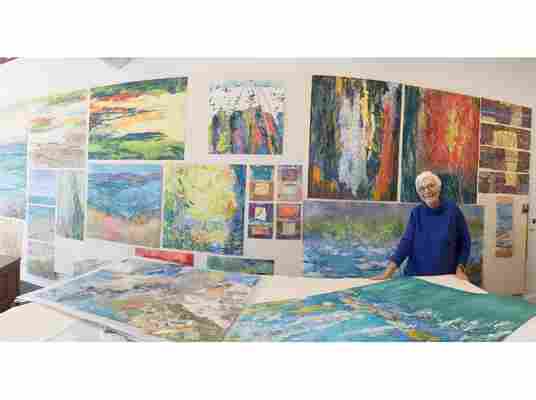
At first glance, it might seem like Maine writer and illustrator Jessica Esch happened upon the Archives of American Art by chance. After all, she loves and oftentimes inexplicably lands in a good repository of knowledge.
But the truth is, while perhaps Jess didn’t realize her exact destination, she’d been climbing toward the Archives with the confidence and enthusiasm of a free soloist for a very long time.
Because that’s what Jess does: she climbs.
One foothold leads to another and another and another. Her focus pairs with curiosity as she engages with the most amazing people, places, and life lessons along her route. I’ve had the joy of watching her and, in many cases, benefiting from the trickle-down effect. Perhaps the best part is witnessing Jess when she reaches a summit so high and glorious it changes her forever. Such was the case when she arrived at the Archives, especially when she encountered mixed media and textile artist Barbara Lee Smith .
When the coronavirus pandemic hit, Jess declared Thursdays “Documentary Day.” Call it ritual or salve, it was something Jess could control and count on. Week after week, she dove into women’s lives who served as inspiration and, in most cases, invitations to climb. One Thursday, a film about sculptor Ursula von Rydingsvard led to a podcast interview, which led to the Nanette L. Laitman Documentation Project for Craft and Decorative Arts in America , one of several special projects that are part of the Archives’ Oral History Program . Let’s just say, Jess became slightly obsessed.
“I knew oral histories were a thing, but I never thought there might be transcripts. I was enamored from the start,” recalled Jess. “I downloaded the transcript for von Rydingsvard then started looking around.” Faced with 235 names, Jess chose the most common: Smith. Barbara L. Smith to be exact. Jess later told me it was divine intervention.
“I was scrolling and scrolling through Barbara’s transcript online and just couldn’t stop so I downloaded that transcript too.” Jess continued, “I felt like I was eavesdropping on an intimate conversation. The Archives are as close to the source as you can get.”
“Barbara popped off the page. She’s a storyteller and shares her aha moments in a way that they become your moments too,” said Jess. “When I finished her transcript, I wanted to know more about her work. But first, I had to let Barbara know what her life, her words meant to me.”
Head and heart full, Jess sat down and typed Barbara a letter. Coincidentally, she sat down during a coronavirus pandemic at a Smith Corona Standard typewriter that once belonged to her friend named Barbara whose parents bought it for her in 1938, the year Barbara Smith was born.
“It was a little much,” said Jess, thinking back on her worlds converging.
Before Jess knew it, she was ten pages in, typing out questions, sharing pieces of herself, and weaving in sections of the transcript to jog Barbara’s memory. After all, March marks twelve years since Barbara sat for her oral history. “I had a really good time writing the letter and had no expectations of a response,” said Jess. “I wrote it for me, to express my gratitude.”
Expectations aside, Barbara served up a response that blew Jess away and set a friendship in motion. “I’m not used to getting fan mail,” said Barbara. “When I read Jess’ letter, it took me back to my two-day interview. It moved me. I knew I wanted to respond, but first I had to put it away, let it gel.”
Then the words came: “You’ve given me a present, by the way, in telling me that those two days of (relaxed, but difficult) talking about myself had meaning for someone else,” wrote Barbara.
As she wrote, she realized there was something to reply to on every page. So Barbara, ever the artist, interleaved Jess’s original letter with her handwritten, charcoal-sketched pages and sewed the binding to create an exquisite hand-stitched book. The book, capturing their first conversation, is an artwork in its own right. The day Jess showed it to me, carefully placing it on an outdoor picnic table so I could observe it while she stood safely at a distance, it’s hard to say whether I took more delight in Barbara’s masterpiece or Jess’ giddiness as she watched me take it all in.
“Barbara set a high bar for letter writing. Her mention of a love for E.B. White prompted Jess to send Some Writer: The Story of E.B. White, signed and personally addressed to Barbara by award-winning author Melissa Sweet. Not to be outdone, Barbara lobbed back copies of a letter her mother sent to E.B. White and the one he sent back in 1970. Every interaction—be it a piece of mail, email, or Instagram exchange—a delightful surprise.
Perhaps it was one oral history, two days of interviews, and twelve years ago, but the impact of Barbara’s transcript is impossible to measure. “I love saying something that sends somebody off in a direction I never could have predicted, like in this case with Jess,” said Barbara. “I want people to find their own path.”
Barbara quickly added that the Archives are a wonderful way for people to explore and engage. “The Smithsonian is not just stuff. It’s people. It’s an extraordinary invitation. It’s fun.”
Fun.
That’s a new slant on the Archives that interim director Liza Kirwin appreciated hearing when Jess reached out via email to declare her love for the Archives. “Typically, oral histories are accessed by academics for research,” said Kirwin. “We don’t often hear about the creative and expansive ways they’re used. Connecting people in a meaningful way is the best expression of what we do.”
Now connected thanks to the Archives, Jess and Barbara couldn’t agree more.
Explore More:
